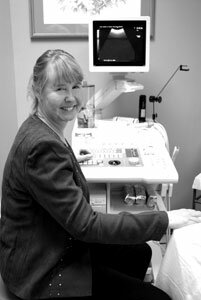FACETIME- Hot flash: Pinkerton's midlife medical mission
JoAnn Pinkerton knows more about menopause than most other 52-year-old women.
She's the director of the Midlife Health Center at UVA, the clinic she started in 1995 in an effort to bring the community a comprehensive approach to menopause care.
"We wanted a multidisciplinary approach," she says. "It's been a great synergy."
"It's not just about fixing hot flashes and night sweats," agrees head nurse Jackie Roberts. "She understands that there's a whole lot more to it than that, and she has hired people to help facilitate her vision. We're all on the same page."
The group involves doctors from several different fields, and their activities include patient care, clinical trials, and educational outreach.
That last element became particularly important after the pulication of the 2002 Women's Health Initiative study that pointed to an increased risk of breast cancer in women using estrogen and progestin therapy. After media outlets spread the word with Pinkerton believes was more sensationalism than responsibility, she was left picking up the pieces.
"There was a huge amount of panic from women who saw numbers flashing on their television screen– 'Estrogen causes a 26 percent risk of breast cancer,'" she sighs. "It was clear that there was sort of a media frenzy. Nobody knew how to answer them. The patients were scared; the doctors were scared."
Pinkerton and her team at the Center assembled a panel for an open forum at the Omni Hotel and invited the public in to set things straight– primarily, that is, to explain that it was a 26 percent increase relative to a relatively small incidence, not a one-in-four shot.
"About 600 women came. It was incredible," she recalls. "They came in very frightened and left feeling very powerful, because knowledge was what they wanted."
Nevertheless, the study's findings did prove to be useful: "All the observational studies in the world can't give you the same answers that a large clinical trial can," says Pinkerton.
In the study, 16,000 women were followed for five years. "We learned a lot– we've spent the last four years trying to figure out what we've learned," she says.
Pinkerton, the Midlife Health Center, and the rest of the menopause treatment world– including the North American Menopause Society, where she serves on the board of trustees– have been gradually coming to terms with the findings, trying to move to alternate therapies as appropriate, and separating the ones that can work– for example, soy products and lifestyle changes– from snake oils like dong quai and ginseng.
"That's what we do at the clinic, every patient, every day," she says. "What's the best thing for this person at this time?'"
To emphasize her point, she adds slyly, "Placebo works 50 percent of the time."
In other words, wellness is more than the sum of its parts. But she could have told us that back in 1995.

JoAnn Pinkerton
PHOTO BY JEN FARIELLO
#